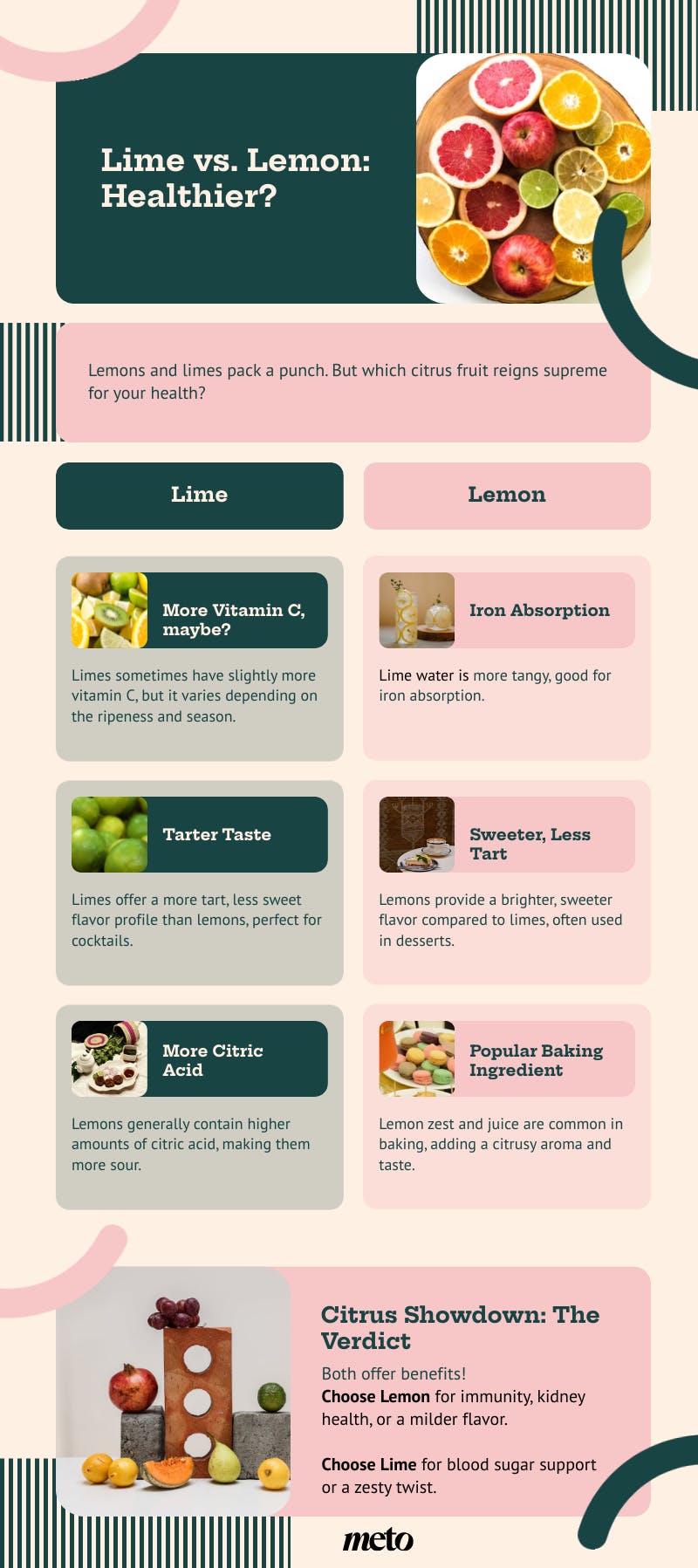Lime vs. Lemon: Which Is Healthier for You? Benefits, Nutrition, and How to Choose
By Karyn O.
Reviewed by Kenya Bass, PA-C
Published Jun 19, 2025
10 min read

Introduction: Lime vs. Lemon – What’s the Real Difference?
If you've ever reached for a citrus fruit to add some zing to your water, brighten up a dish, or get a boost of vitamin C, chances are you've grabbed either a lemon or a lime. These two fruits are often used interchangeably, but they’re not the same. So, what actually makes a lemon different from a lime? And more importantly, is one healthier than the other?
This question isn’t just about taste—it touches on everything from nutrition and health benefits to how they affect your digestion, metabolism, skin, and even blood sugar. Whether you’re trying to lose weight, improve your immunity, or just curious about which citrus fruit is better for your body, this guide breaks it all down in simple terms.
Let’s dive into the world of lemons and limes—and help you choose which one works best for your health goals.
Key Similarities Between Lime and Lemon
First things first—lemons and limes are part of the same citrus family. Both are small, sour fruits known for their bright flavor and refreshing smell. You’ll often find them next to each other in the produce section, and for good reason: they share quite a few similarities.
Both fruits are acidic and contain similar levels of citric acid. They’re rich in vitamin C, a powerful antioxidant that helps support your immune system and fight inflammation. They’re also both low in calories and sugar, making them excellent choices for flavoring food and drinks without adding extra junk.
Limes and lemons are used in cooking, baking, cocktails, teas, and natural remedies. From salad dressings to cleaning solutions, they’re versatile and useful in everyday life.
So while they’re similar in many ways, there are some big differences when you look closely, especially when it comes to their nutrition, taste, and health benefits.
Nutritional Breakdown: Lime vs. Lemon
When comparing lemons and limes nutritionally, they’re more alike than different. However, there are a few small differences worth noting.
Lemons tend to have slightly more vitamin C and folate, while limes contain a bit more vitamin A. Both are very low in calories and carbohydrates, making them great for people watching their weight or managing blood sugar levels.
Here’s a simple breakdown based on one medium-sized fruit:
- Calories: Both lemons and limes have around 20 calories or less.
- Vitamin C: Lemons have about 30–35% more vitamin C than limes.
- Carbohydrates: Both contain around 7 grams of carbs per fruit, mostly from natural sugars.
- Fiber: Each fruit provides about 2 grams of dietary fiber (if you eat the pulp).
- Other nutrients: Limes contain slightly more vitamin A, while lemons offer a little more folate and potassium.
In real-life terms, these small differences won’t make or break your health. But if you're looking to maximize vitamin C, lemons edge out slightly ahead.
Health Benefits of Lemons
Lemons are more than just a garnish. They’re packed with nutrients that offer real benefits for your health.
One of the biggest perks of lemons is their high vitamin C content. This antioxidant helps protect your cells from damage, boosts your immune system, and supports skin health. Vitamin C also plays a key role in producing collagen, which is important for smooth skin and strong joints.
Many people drink warm lemon water in the morning to support digestion. The acidity of lemon juice may help stimulate stomach acid and bile production, which aids in breaking down food and absorbing nutrients.

Lemons are also linked to weight loss, mostly because they help you stay hydrated and may slightly increase metabolism when consumed regularly with water. While they won’t melt away fat on their own, they’re a helpful part of a healthy diet.
And if you’ve ever heard that lemons help prevent kidney stones, there’s some science behind it. Lemons contain citric acid, which may help reduce the formation of calcium-based stones in the kidneys.
Lastly, lemons may support heart health thanks to their flavonoids, which help lower blood pressure and improve blood flow.
Health Benefits of Limes
Limes may be smaller, but they’re just as mighty when it comes to health benefits.
Like lemons, limes are rich in vitamin C and antioxidants. These help reduce inflammation, protect cells from oxidative stress, and support your immune system. Some studies even suggest that limes have antibacterial and antiviral properties that may help prevent infections.
One unique benefit of limes is their ability to enhance iron absorption. If you're low on iron or follow a plant-based diet, squeezing lime juice over iron-rich foods like spinach or beans can help your body absorb more of this essential mineral.
Limes are also beneficial for blood sugar control. Their fiber and plant compounds may help slow the absorption of sugar into the bloodstream, which is helpful for people managing diabetes or insulin resistance.
The antioxidants in limes also support skin health by reducing signs of aging, improving elasticity, and promoting collagen production. Some people even use lime juice topically (though be cautious—lime on skin can cause irritation in sunlight).
And just like lemons, limes can support digestion and hydration when added to water or meals.
Lime vs. Lemon: Which Is Better For…
Immunity?
Lemons win this round. While both are high in vitamin C, lemons contain more of it—making them slightly better at boosting immune function.
Weight Loss?
It’s a tie. Both fruits are low in calories and sugar, and both can help with hydration and digestion. Whether you choose lemon or lime water, both support healthy habits that contribute to weight loss.
Heart Health?
Both are good for your heart, thanks to their flavonoids and antioxidants. However, lemons may have a slight edge due to their higher potassium and folate levels, both of which support cardiovascular health.
Blood Sugar Balance?
Limes may offer a small advantage. Their specific flavonoids and lower sugar content may help slow glucose absorption, making them a smart addition for people managing blood sugar.
Skin and Anti-Aging?
Lemons and limes both contain vitamin C and antioxidants that support collagen production and reduce free radical damage. There’s no clear winner here—they’re both great for skin.

RELATED READ: Mandarin vs. Clementine: Key Nutrition Differences, Health Benefits & Which Is Better for You
Potential Downsides and Precautions
Even though lemons and limes are healthy, they’re not perfect for everyone.
Both fruits are acidic, which can erode tooth enamel if consumed frequently without rinsing your mouth afterward. If you drink lemon or lime water daily, consider using a straw and rinsing with water after to protect your teeth.
Some people may be allergic to citrus or sensitive to its acidity. This can lead to mouth sores, heartburn, or digestive upset. If that’s the case, it’s best to limit or avoid them.
Lime juice can also cause skin irritation when exposed to sunlight, a reaction known as phytophotodermatitis. So if you’re using lime juice on your skin, wash it off before heading outside.
Also, both fruits may interact with certain medications, especially those for blood pressure or infections. If you're taking medication and unsure, talk to your doctor before making citrus a daily habit.
Culinary and Everyday Uses: How to Choose
In the kitchen, lemons and limes serve similar roles, but each brings its own flavor and flair.
Lemons have a brighter, slightly sweeter flavor, making them ideal for baking, salad dressings, and drinks like lemon water or lemonade. Their zest is often used in desserts, sauces, and marinades.
Limes have a tangier, sharper bite, which is why they’re often found in savory dishes, Mexican and Thai cuisine, and cocktails like margaritas or mojitos. Their zest and juice pair well with chili, garlic, and ginger.
If a recipe calls for one and you only have the other, it usually works to swap them in small amounts. Just be mindful of the flavor shift.
Outside the kitchen, both are used in natural cleaning solutions due to their acidity. They’re also found in skincare routines—though lemon is more commonly used for brightening, while lime has more caution around skin use.
Taste and Aroma: Lime vs. Lemon in Flavor Profiles
While both are sour, lemons tend to have a sweeter, more floral aroma. Limes are more bitter and zesty, with a stronger citrus punch.
This difference in flavor makes lemons better suited for sweeter dishes and desserts, while limes shine in spicy or savory recipes.
If you’re after a mellow citrus note, go with lemon. If you want something sharper and more intense, lime is your friend.
Lime Water vs. Lemon Water: Which Is Better for Morning Detox?
Many people swear by starting their day with warm lemon water. But could lime water offer the same benefits?
The answer is yes. Both lemon and lime water support hydration, provide a small dose of vitamin C, and may stimulate digestion when consumed first thing in the morning.

Some say lemon water tastes smoother and is easier to drink in larger quantities, which may make it more popular. But nutritionally, both offer similar detox-friendly benefits.
If you’re trying to reduce bloating, support your liver, or just start the day with something refreshing, either option will work well. The best choice depends on your taste preference.
Sustainability and Availability
In terms of sustainability, lemons are often more widely grown and available year-round in many parts of the world, especially in temperate climates. Limes tend to thrive in tropical and subtropical regions.
Lemons usually cost slightly less and have a longer shelf life, especially when stored in the refrigerator. They also tend to yield more juice than limes of the same size.
However, if you live in a warmer climate or tropical region, limes may be cheaper and easier to find. It all depends on where you live and what’s in season.
RELATED READ: 20 Best Fruits That Boost Your Metabolism Naturally (Backed by Science)
Final Verdict: Is One Really Better Than the Other?
There’s no one-size-fits-all answer. Both lemons and limes are healthy, low-calorie fruits packed with antioxidants and vitamin C. They support hydration, digestion, immune health, and even your skin.
If you’re looking for more vitamin C and a slightly milder flavor, lemons might be your go-to. If you prefer a tangy punch and possibly better blood sugar support, limes could be a better fit.
The truth is, you can benefit from both. And variety in your diet is always a good thing.
FAQs
1. Can I substitute lime for lemon in recipes?
Yes, in most cases you can. Just expect a slightly different flavor—limes are more bitter, while lemons are a bit sweeter.
2. Which has more vitamin C, lemon or lime?
Lemons have slightly more vitamin C than limes.
3. Is lime or lemon more alkaline?
Both are acidic in nature but have an alkalizing effect in the body once metabolized.
4. Can lemon or lime reduce belly fat?
Not directly. But both can support weight loss by promoting hydration, digestion, and appetite control.
5. Is lemon or lime better for acid reflux?
Neither is ideal if you have acid reflux, as both are highly acidic and may trigger symptoms.
Key Takeaways
- Lemons and limes are both healthy citrus fruits rich in vitamin C and antioxidants.
- Lemons have more vitamin C and are slightly better for immunity and kidney stone prevention.
- Limes may be better for iron absorption and blood sugar balance.
- Both support digestion, skin health, and hydration.
- Your choice depends on your goals, taste preferences, and availability.
So next time you’re choosing between a lemon and a lime, just remember: you can’t really go wrong with either.
Share this article

Low Sodium Diet: Simple Guidelines, Food Lists, and Tips for Better Health
Lilian E.
Sep 30, 202512 min read

Does Coconut Milk Affect Blood Sugar Levels? A Complete Guide for Diabetes and Healthy Living
Karyn O.
Sep 29, 202510 min read

Fasting Insulin Test Explained: Normal Ranges, Results & Prevention
Lilian E.
Jan 16, 20266 min read

Best-in-class care is a click away
Find everything and everyone you need to reach your metabolic health goals, in one place. It all makes sense with Meto.
Join Meto